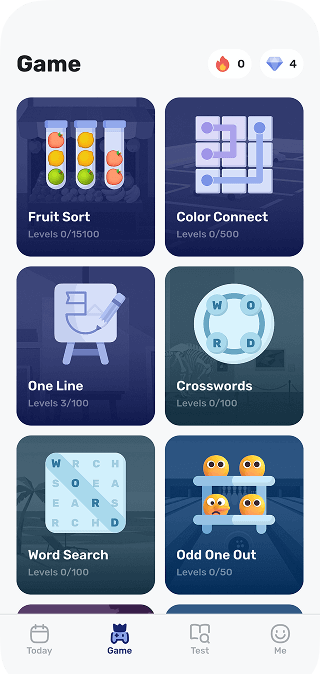How to Improve Memory: 12 Daily Habits You Can Start Today
Denise Murphy Editor / Oct 16, 2025
Have you ever walked into a room and suddenly forgotten why you were there? Or remembered something you forgot to bring only after leaving home? Or you have just exchanged greetings but forgotten their names only seconds later?

Memory lapses happen to everyone, especially when our brains are overloaded with distractions and redundant information. While age and genes are always to blame for some conditions, poor memory may also be caused by various factors.
What Affects Your Memory?
Memory is influenced by far more than just age or genetics, it’s deeply influenced by your lifestyle. Factors like sleep quality, stress levels, nutrition, and even how often you multitask can all play a role in how well your brain processes and recalls information.
For example, constant stress raises cortisol levels, which can damage the hippocampus - the part of the brain crucial for memory over time. Inadequate sleep interferes with memory consolidation, while a poor diet deprives the brain of essential nutrients.
The good news is that memory is not fixed! Recognizing these influences is the first step toward change. With proper habits, you can boost brain power, stay focused, and protect your memory for years to come.
12 Daily Habits to Improve Memory
1. Stay Physically Active
While the benefits of physical exercise are commonly mentioned across a wide range of health-related topics, it also plays a significant role in enhancing memory. Regular physical activity improves brain function and supports memory retention in both the short and long term by stimulating the hippocampus.
Renowned neuroscientist Carl Cotman found that just 6 months of aerobic exercise can actually reverse one to two years of age-related brain shrinkage. It also increases the production of a protein called brain-derived neurotrophic factor (BDNF), which supports the growth of new neurons. These changes are often accompanied by noticeable improvements in memory and cognitive performance.
2. Fuel Memory With Fish
Fatty fish like salmon, mackerel, tuna, herring, and sardines are some of the best natural sources of omega-3 fatty acids, particularly EPA and DHA—two nutrients that play vital roles in memory. Numerous studies have linked a higher intake of omega-3 with improved memory ability, cognitive well-being, and a reduced risk of age-related conditions like Alzheimer’s disease.
Since our human body cannot produce enough EPA and DHA on its own, consuming one to two servings of oily fish per week is widely recommended to support cognitive function. For those who don’t enjoy eating fish, fish oil supplements offer an effective and convenient alternative.
At the same time, plant-based omega-3s—like ALA (alpha-linolenic acid) found in flaxseeds, chia seeds, and walnuts can also contribute to brain health. However, the body converts ALA into EPA and DHA inefficiently (only 5% to 20%), making plant sources a less preferable option compared to marine-based omega-3s.
3. Nurturing Memory With “MM”
Our minds often race with worries and distractions in the fast pace of modern life, making it hard to focus and remember clearly. Mindfulness Meditation (MM) provides a refuge for us to escape chaos and quiet the noises. By encouraging us to accept thoughts and emotions rather than avoid them, these practices foster greater mental clarity and calm.
Even a single, brief mindfulness meditation intervention could improve short-term memory. Compared to other ways of spending time like audiobooks, mindfulness meditation not only boosts memory but also relieves our anxiety, offering a powerful way to nurture both mind and mood.

4. Share Time Together
Spending time with others does more than bring joy, it can also boost memory and cognitive health! When we engage in conversations, games, or reminisce about shared experiences, we activate important areas of the brain tied to memory and recall. Social interactions encourage us to think, respond, and remember details, which keeps the mind active and sharp.
Even a simple walk or meal with someone can strengthen both social relationships and brain health, especially for those who live alone.
5. Limit Multitasking
Multitasking has become a necessary skill for most of us nowadays. However, it can negatively affect both memory and focus. Researchers from Stanford University show that heavy multitaskers tend to have poorer cognitive control compared to those who multitask less. When we shift between tasks, it causes our brain to experience cognitive costs that weaken memory retention. Reducing multitasks allows our brain to work more efficiently, thus having better memory performance.
6. Get Quality Sleep
Sleep cycles consist of several stages during the night, with Slow-Wave Sleep (SWS) and Rapid Eye Movement (REM) sleep being particularly important for memory and learning. During these stages, the brain consolidates new information, organizes experiences, and strengthens long-term memories. In contrast, poor sleep impairs attention, learning, and recall. Quality sleep helps to stabilize and integrate your memory traces, improving overall memory performance.

7. Train Your Brain
Studies show that doing brain training tends to have more improvements, especially in areas such as processing speed, short-term memory, and working memory. Training your brain doesn’t have to be boring or intense, simple mental activities can go a long way. There are plenty of fun games and apps designed to keep your brain active without making it feel like hard work. Apps like Impulse and Free Brain Training allow you to train your mind anytime, anywhere from your phone. Over time, these small daily challenges can help boost your focus and memory in a way that fits naturally into your routine.
8. Set Organized Routines
Organised routines can make a big difference in improving your memory. If you find it hard to stay organised, at least keep your important items like keys, wallet, or phone in the same place every day. This reduces the mental load of searching for them and avoids frustrating moments of forgetting where they are. When your environment is tidy and predictable, your brain has more space to focus on other tasks, making it easier to remember what matters.
9. Make Visual Associations
Using visual connections is a simple but helpful method to improve memory. By linking new information to vivid images, your brain forms stronger and more lasting memories. This process also makes recalling information easier as your mind can “see” the figure instead of just trying to remember abstract words or numbers.

10. Incorporate Music
Music therapy has been shown to reduce cognitive decline and improve mood, making it a powerful daily habit for brain health. Furthermore, background music that induces positive emotional states can enhance cognitive functions. It is well known that music has the power to evoke emotions, and these emotional responses can support better focus and help strengthen memory.
11. Write Things Down
Writing down information usually requires more effort because it engages multiple senses—seeing, writing, and sometimes speaking. This simple habit reduces the chances of forgetting and allows you to revisit details later. Whether it’s jotting notes during a meeting, making to-do lists, or putting thoughts on paper, writing strengthens your brain’s ability to retain and organize information.
12. Managing Stress
It is normal that stress is often associated with anxiety and insomnia. However, stress can also weaken memory by affecting how the brain processes and stores information. When you feel stressed, try to find time and methods to manage it, preventing chronic stress from starting to impact your memory.
When Is the Time to Seek Help?
While lifestyle habits like getting enough rest, eating a balanced diet and so on can all enhance memory, it is still important to pay attention to changes that go beyond everyday forgetfulness. If you or your friend is experiencing more frequent memory lapses that interfere with daily life like getting lost in familiar places or struggling to follow conversations, it may be time to consult a healthcare professional.
A psychologist, neurologist, or doctor can help assess whether these changes are part of normal aging or signs of more serious conditions. Seeking help early not only relieves worry but also makes more options available for effective treatment.

Final Thoughts
Improving memory is not a night miracle, it’s building small but sustainable habits that support your brain in the long run. The strategies discussed in this article, from daily routines to mental exercises, can all make a meaningful difference. With the proper habits and awareness, anyone can take meaningful steps toward a sharper, more confident memory.
Disclaimer
Any assessments and their associated content on this website, regardless of date, are not intended to replace direct medical advice from your physician or other professional. If you experience severe or persistent symptoms, please consult a licensed mental health professional or healthcare provider.












